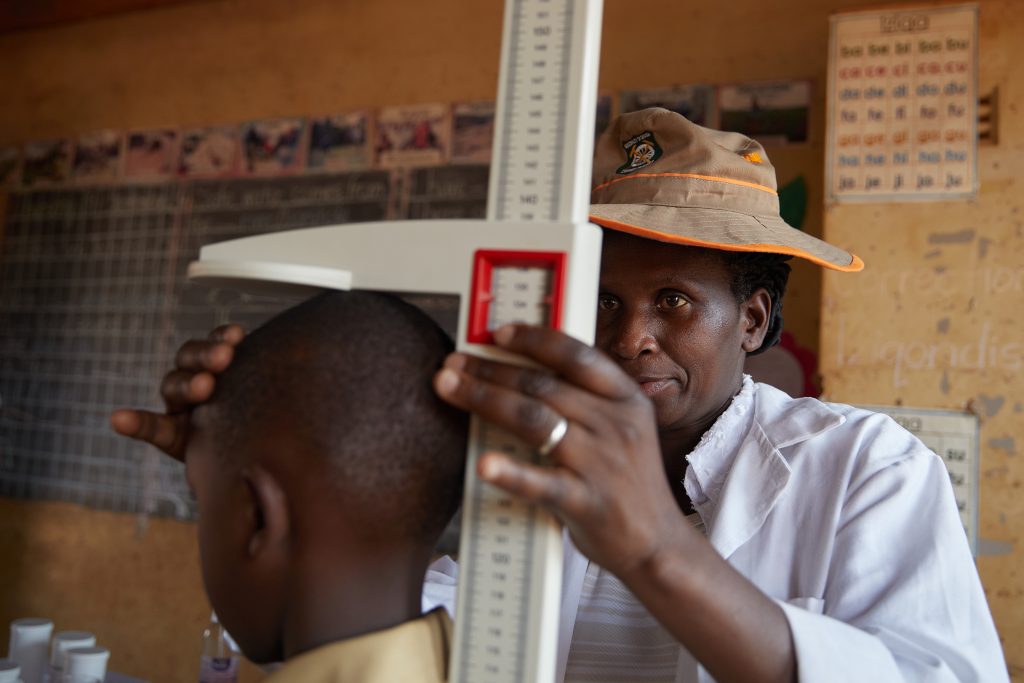Rebecca Mwabvu
Higherlife Foundation’s mission is to invest in human capital development to build sustainable livelihoods in African countries. The Foundation’s investments are strategically focused on three core pillars: Education, Global Health and Rural Transformation, and Sustainable Livelihoods. These pillars are interwoven with Climate and Gender initiatives, recognizing their crucial role in sustainable development.
Education, the cornerstone of our work, provides access and enhances learning opportunities for orphaned, vulnerable children, and talented scholars. We believe that education is the key to unlocking potential and transforming lives.

However, education cannot thrive in isolation. The emergence of health crises, climate-induced emergencies and the need for responsive leadership to save lives led to the establishment of our Global Health pillar. This pillar aims to catalyse health solutions that provide access to quality health services for the most vulnerable populations and strengthen the resilience of Zimbabwe’s healthcare system.
Our Global Health initiatives have evolved over time. In previous years, we contributed to eliminating cholera and bolstering disaster relief and preparedness. Currently, our major investments are directed towards maternal and neonatal health and Neglected Tropical Diseases. We believe that addressing these critical areas is essential for building a healthier and more prosperous Zimbabwe.
Neglected Tropical Diseases, known in medical nomenclature as NTDs, are defined by the World Health Organisation as a diverse group of conditions mainly prevalent in low-income communities.
As Higherlife Foundation, our goal is clear: we are working towards an NTD-free Zimbabwe. Ending NTDs goes beyond health; it is about building stronger economies and brighter futures.
Our work in the NTD space, over the past 10 years, has been possible through significant investments from Delta Philanthropies. Through this period, we have invested into the national NTDs program, supporting the distribution of more than 38 million treatments for bilharzia (Schistosomiasis), intestinal worms (Soil transmitted helminths), elephantiasis (Lymphatic filariasis) and Trachoma.

We have recorded successes especially towards the elimination of bilharzia, elephantiasis and intestinal worms among children of school-going age in rural Zimbabwe.
Today on World NTDs day, we reflect on the theme “Unite. Act. Eliminate” and how it resonates with the approach we have adopted in fulfilling our mandate in the fight against NTDs.
Collaborations
In all our work, we have leveraged relationships built through patience, shared values and dedication.
- Communities First: Our biggest partners are the communities we serve. Every time we design a program, whether a mass drug administration or an awareness exercise, we consider our communities first. We prioritize a bottom-up approach, listening to their needs and tailoring our programs accordingly.
- Engaging Traditional Leaders: We work closely with traditional leaders in rural communities to ensure they understand and support our NTD interventions. This helps translate scientific concepts into relatable language and fosters community ownership.
- Anchoring on existing community networks and systems: Community health workers are another vital cog in the fight against NTDs. They are the first line of defence in Zimbabwe’s public health system and we rely on them to encourage health-seeking behaviours within communities. Community health workers provide real-time updates on any issues that may be emerging in the case of suspected outbreaks and they play an active role in dispelling disinformation.
- Collaboration with the Ministry of Health and Child Care: We partner with the Ministry of Health and Child Care (MoHCC) in Zimbabwe to ensure alignment and maximize the impact of our efforts.
- Leveraging on existing Global Expertise: We leverage on technical support provided by the END Fund. END Fund has gone on the forefront ensuring that our NTD Programs get the medicines required for treating populations working closely with Pharmaceutical companies and World Health Organisation who have extended generous donations.
When we supported the implementation of the elephantiasis mass drug administration in September 2024, we achieved 73.5% coverage, which is above the World Health Organisation threshold – a sign that our unique and inclusive approach is effective.

Successes
We are happy with what we have achieved since entering the NTD space. Together with the Ministry of Health and Child Care, we have recorded an 86% reduction in the number of people requiring treatment for elephantiasis.
In 2014, 8.4 million people were at risk of elephantiasis and through consistent distribution of treatment, 1.2 million people stand at risk.
For bilharzia (SCH), Zimbabwe has made progress since 2010, where the prevalence of reduced from 22.7% in 2010 to 10.7% in 2021. For intestinal worms (STH) Zimbabwe has almost reached elimination as a public health problem, with a 1.9% prevalence. This has resulted in a 79% reduction in children requiring treatment for intestinal worms, decreasing from 3.4 million in 2010 to 700,000 in 2021.
We work closely with the National Institute of Health Research under the Ministry of Health and Child Care to ensure that all our interventions are informed by science.
Over the years, we have conducted research and surveys to gain a full picture of the spread of disease and the dangers attendant to each community.
Inspiration
We draw strong inspiration from other countries and regions which have made immense progress in their fight against NTDs.
One country of note is Togo, Togo stands as a shining example of what’s possible in the fight against Neglected Tropical Diseases (NTDs). In a remarkable feat, Togo is the first country recognized by the World Health Organization for conquering four NTDs (Guinea worm disease (Dracunculiasis), Lymphatic filariasis (Elephantiasis), Human African trypanosomiasis (Sleeping sickness) and Trachoma) in just eleven years. Togo’s success story provides a powerful testament to the impact of dedicated efforts, strong leadership, and effective public health interventions in the fight against NTDs. It serves as an inspiration to other nations striving to achieve similar victories and create a healthier future for their citizens.
Another success story is Rwanda, they are on a strong course to eliminate Schistosomiasis as a public health concern. In the 17 years between 2000 and 2017, they managed to halve the disease burden in the country. END Fund, with whom we have been working and gaining immensely from their technical knowledge in the fight against NTDs, has been instrumental in assisting the East African country.
As Higherlife Foundation, we are determined to ensure that Zimbabwe and other countries in the Southern Africa region are added to the list of countries that have managed to reduce NTDs to the point of elimination.
Our strides so far give us confidence that we can achieve this audacious goal. An NTD-free world is possible in our lifetime. We need all hands on deck in the fight.
- Rebecca Mwabvu is the General Manager, Global Health, at Higherlife Foundation. She wrote this article on World NTDs Day 2025.

